- Home
- Anthony Trollope
Doctor Thorne Page 8
Doctor Thorne Read online
Page 8
CHAPTER VIII
Matrimonial Prospects
It will of course be remembered that Mary's interview with the othergirls at Greshamsbury took place some two or three days subsequentlyto Frank's generous offer of his hand and heart. Mary had quite madeup her mind that the whole thing was to be regarded as a folly, andthat it was not to be spoken of to any one; but yet her heart wassore enough. She was full of pride, and yet she knew she must bow herneck to the pride of others. Being, as she was herself, nameless, shecould not but feel a stern, unflinching antagonism, the antagonism ofa democrat, to the pretensions of others who were blessed with thatof which she had been deprived. She had this feeling; and yet, ofall the things that she coveted, she most coveted that, for gloryingin which, she was determined to heap scorn on others. She said toherself, proudly, that God's handiwork was the inner man, the innerwoman, the naked creature animated by a living soul; that all otheradjuncts were but man's clothing for the creature; all others,whether stitched by tailors or contrived by kings. Was it not withinher capacity to do as nobly, to love as truly, to worship her God inheaven with as perfect a faith, and her god on earth with as leal atroth, as though blood had descended to her purely through scoresof purely born progenitors? So to herself she spoke; and yet, asshe said it, she knew that were she a man, such a man as the heirof Greshamsbury should be, nothing would tempt her to sully herchildren's blood by mating herself with any one that was base born.She felt that were she an Augusta Gresham, no Mr Moffat, let hiswealth be what it might, should win her hand unless he too could tellof family honours and a line of ancestors.
And so, with a mind at war with itself, she came forth armed to dobattle against the world's prejudices, those prejudices she herselfloved so well.
And was she to give up her old affections, her feminine loves,because she found that she was a cousin to nobody? Was she no longerto pour out her heart to Beatrice Gresham with all the girlishvolubility of an equal? Was she to be severed from Patience Oriel,and banished--or rather was she to banish herself--from the freeplace she had maintained in the various youthful female conclavesheld within that parish of Greshamsbury?
Hitherto, what Mary Thorne would say, what Miss Thorne suggested insuch or such a matter, was quite as frequently asked as any opinionfrom Augusta Gresham--quite as frequently, unless when it chancedthat any of the de Courcy girls were at the house. Was this to begiven up? These feelings had grown up among them since they werechildren, and had not hitherto been questioned among them. Now theywere questioned by Mary Thorne. Was she in fact to find that herposition had been a false one, and must be changed?
Such had been her feelings when she protested that she would not beAugusta Gresham's bridesmaid, and offered to put her neck beneathBeatrice's foot; when she drove the Lady Margaretta out of the room,and gave her own opinion as to the proper grammatical construction ofthe word humble; such also had been her feelings when she kept herhand so rigidly to herself while Frank held the dining-room door openfor her to pass through.
"Patience Oriel," said she to herself, "can talk to him of her fatherand mother: let Patience take his hand; let her talk to him;" andthen, not long afterwards, she saw that Patience did talk to him; andseeing it, she walked along silent, among some of the old people, andwith much effort did prevent a tear from falling down her cheek.
But why was the tear in her eye? Had she not proudly told Frank thathis love-making was nothing but a boy's silly rhapsody? Had she notsaid so while she had yet reason to hope that her blood was as goodas his own? Had she not seen at a glance that his love tirade wasworthy of ridicule, and of no other notice? And yet there was a tearnow in her eye because this boy, whom she had scolded from her, whosehand, offered in pure friendship, she had just refused, because he,so rebuffed by her, had carried his fun and gallantry to one whowould be less cross to him!
She could hear as she was walking, that while Lady Margaretta waswith them, their voices were loud and merry; and her sharp ear couldalso hear, when Lady Margaretta left them, that Frank's voice becamelow and tender. So she walked on, saying nothing, looking straightbefore her, and by degrees separating herself from all the others.
The Greshamsbury grounds were on one side somewhat too closely hemmedin by the village. On this side was a path running the length of oneof the streets of the village; and far down the path, near to theextremity of the gardens, and near also to a wicket-gate which ledout into the village, and which could be opened from the inside, wasa seat, under a big yew-tree, from which, through a breach in thehouses, might be seen the parish church, standing in the park on theother side. Hither Mary walked alone, and here she seated herself,determined to get rid of her tears and their traces before she againshowed herself to the world.
"I shall never be happy here again," said she to herself; "never. Iam no longer one of them, and I cannot live among them unless I amso." And then an idea came across her mind that she hated PatienceOriel; and then, instantly another idea followed it--quick as suchthoughts are quick--that she did not hate Patience Oriel at all; thatshe liked her, nay, loved her; that Patience Oriel was a sweet girl;and that she hoped the time would come when she might see her thelady of Greshamsbury. And then the tear, which had been no whitcontrolled, which indeed had now made itself master of her, came to ahead, and, bursting through the floodgates of the eye, came rollingdown, and in its fall, wetted her hand as it lay on her lap. "What afool! what an idiot! what an empty-headed cowardly fool I am!" saidshe, springing up from the bench on her feet.
As she did so, she heard voices close to her, at the little gate.They were those of her uncle and Frank Gresham.
"God bless you, Frank!" said the doctor, as he passed out of thegrounds. "You will excuse a lecture, won't you, from so old afriend?--though you are a man now, and discreet, of course, by Act ofParliament."
"Indeed I will, doctor," said Frank. "I will excuse a longer lecturethan that from you."
"At any rate it won't be to-night," said the doctor, as hedisappeared. "And if you see Mary, tell her that I am obliged to go;and that I will send Janet down to fetch her."
Now Janet was the doctor's ancient maid-servant.
Mary could not move on without being perceived; she therefore stoodstill till she heard the click of the door, and then began walkingrapidly back to the house by the path which had brought her thither.The moment, however, that she did so, she found that she wasfollowed; and in a very few moments Frank was alongside of her.
"Oh, Mary!" said he, calling to her, but not loudly, before he quiteovertook her, "how odd that I should come across you just when I havea message for you! and why are you all alone?"
Mary's first impulse was to reiterate her command to him to call herno more by her Christian name; but her second impulse told her thatsuch an injunction at the present moment would not be prudent on herpart. The traces of her tears were still there; and she well knewthat a very little, the slightest show of tenderness on his part, theslightest effort on her own to appear indifferent, would bring downmore than one other such intruder. It would, moreover, be betterfor her to drop all outward sign that she remembered what had takenplace. So long, then, as he and she were at Greshamsbury together, heshould call her Mary if he pleased. He would soon be gone; and whilehe remained, she would keep out of his way.
"Your uncle has been obliged to go away to see an old woman atSilverbridge."
"At Silverbridge! why, he won't be back all night. Why could not theold woman send for Dr Century?"
"I suppose she thought two old women could not get on well together."
Mary could not help smiling. She did not like her uncle going off solate on such a journey; but it was always felt as a triumph when hewas invited into the strongholds of his enemies.
"And Janet is to come over for you. However, I told him it was quiteunnecessary to disturb another old woman, for that I should of coursesee you home."
"Oh, no, Mr Gresham; indeed you'll not do that."
"Indeed, and indeed, I shal
l."
"What! on this great day, when every lady is looking for you, andtalking of you. I suppose you want to set the countess against me forever. Think, too, how angry Lady Arabella will be if you are absenton such an errand as this."
"To hear you talk, Mary, one would think that you were going toSilverbridge yourself."
"Perhaps I am."
"If I did not go with you, some of the other fellows would. John, orGeorge--"
"Good gracious, Frank! Fancy either of the Mr de Courcys walking homewith me!"
She had forgotten herself, and the strict propriety on which she hadresolved, in the impossibility of forgoing her little joke againstthe de Courcy grandeur; she had forgotten herself, and had calledhim Frank in her old, former, eager, free tone of voice; and then,remembering she had done so, she drew herself up, bit her lips, anddetermined to be doubly on her guard in the future.
"Well, it shall be either one of them or I," said Frank: "perhaps youwould prefer my cousin George to me?"
"I should prefer Janet to either, seeing that with her I should notsuffer the extreme nuisance of knowing that I was a bore."
"A bore! Mary, to me?"
"Yes, Mr Gresham, a bore to you. Having to walk home through the mudwith village young ladies is boring. All gentlemen feel it to be so."
"There is no mud; if there were you would not be allowed to walk atall."
"Oh! village young ladies never care for such things, thoughfashionable gentlemen do."
"I would carry you home, Mary, if it would do you a service," saidFrank, with considerable pathos in his voice.
"Oh, dear me! pray do not, Mr Gresham. I should not like it at all,"said she: "a wheelbarrow would be preferable to that."
"Of course. Anything would be preferable to my arm, I know."
"Certainly; anything in the way of a conveyance. If I were to actbaby; and you were to act nurse, it really would not be comfortablefor either of us."
Frank Gresham felt disconcerted, though he hardly knew why. He wasstriving to say something tender to his lady-love; but every wordthat he spoke she turned into joke. Mary did not answer him coldlyor unkindly; but, nevertheless, he was displeased. One does not liketo have one's little offerings of sentimental service turned intoburlesque when one is in love in earnest. Mary's jokes had appearedso easy too; they seemed to come from a heart so little troubled.This, also, was cause of vexation to Frank. If he could but haveknown all, he would, perhaps, have been better pleased.
He determined not to be absolutely laughed out of his tenderness.When, three days ago, he had been repulsed, he had gone away owningto himself that he had been beaten; owning so much, but owning itwith great sorrow and much shame. Since that he had come of age;since that he had made speeches, and speeches had been made to him;since that he had gained courage by flirting with Patience Oriel. Nofaint heart ever won a fair lady, as he was well aware; he resolved,therefore, that his heart should not be faint, and that he would seewhether the fair lady might not be won by becoming audacity.
"Mary," said he, stopping in the path--for they were now near thespot where it broke out upon the lawn, and they could already hearthe voices of the guests--"Mary, you are unkind to me."
"I am not aware of it, Mr Gresham; but if I am, do not you retaliate.I am weaker than you, and in your power; do not you, therefore, beunkind to me."
"You refused my hand just now," continued he. "Of all the people hereat Greshamsbury, you are the only one that has not wished me joy; theonly one--"
"I do wish you joy; I will wish you joy; there is my hand," and shefrankly put out her ungloved hand. "You are quite man enough tounderstand me: there is my hand; I trust you use it only as it ismeant to be used."
He took it in his and pressed it cordially, as he might have donethat of any other friend in such a case; and then--did not drop itas he should have done. He was not a St Anthony, and it was mostimprudent in Miss Thorne to subject him to such a temptation.
"Mary," said he; "dear Mary! dearest Mary! if you did but know how Ilove you!"
As he said this, holding Miss Thorne's hand, he stood on the pathwaywith his back towards the lawn and house, and, therefore, did not atfirst see his sister Augusta, who had just at that moment come uponthem. Mary blushed up to her straw hat, and, with a quick jerk,recovered her hand. Augusta saw the motion, and Mary saw that Augustahad seen it.
From my tedious way of telling it, the reader will be led to imaginethat the hand-squeezing had been protracted to a duration quiteincompatible with any objection to such an arrangement on the part ofthe lady; but the fault is mine: in no part hers. Were I possessedof a quick spasmodic style of narrative, I should have been ableto include it all--Frank's misbehaviour, Mary's immediate anger,Augusta's arrival, and keen, Argus-eyed inspection, and then Mary'ssubsequent misery--in five words and half a dozen dashes and invertedcommas. The thing should have been so told; for, to do Mary justice,she did not leave her hand in Frank's a moment longer than she couldhelp herself.
Frank, feeling the hand withdrawn, and hearing, when it was too late,the step on the gravel, turned sharply round. "Oh, it's you, is it,Augusta? Well, what do you want?"
Augusta was not naturally very ill-natured, seeing that in her veinsthe high de Courcy blood was somewhat tempered by an admixture ofthe Gresham attributes; nor was she predisposed to make her brotherher enemy by publishing to the world any of his little tenderpeccadilloes; but she could not but bethink herself of what her aunthad been saying as to the danger of any such encounters as that shejust now had beheld; she could not but start at seeing her brotherthus, on the very brink of the precipice of which the countess hadspecially forewarned her mother. She, Augusta, was, as she well knew,doing her duty by her family by marrying a tailor's son for whom shedid not care a chip, seeing the tailor's son was possessed of untoldwealth. Now when one member of a household is making a struggle for afamily, it is painful to see the benefit of that struggle negativedby the folly of another member. The future Mrs Moffat did feelaggrieved by the fatuity of the young heir, and, consequently, tookupon herself to look as much like her Aunt de Courcy as she could do.
"Well, what is it?" said Frank, looking rather disgusted. "What makesyou stick your chin up and look in that way?" Frank had hitherto beenrather a despot among his sisters, and forgot that the eldest ofthem was now passing altogether from under his sway to that of thetailor's son.
"Frank," said Augusta, in a tone of voice which did honour to thegreat lessons she had lately received. "Aunt de Courcy wants to seeyou immediately in the small drawing-room;" and, as she said so, sheresolved to say a few words of advice to Miss Thorne as soon as herbrother should have left them.
"In the small drawing-room, does she? Well, Mary, we may as well gotogether, for I suppose it is tea-time now."
"You had better go at once, Frank," said Augusta; "the countess willbe angry if you keep her waiting. She has been expecting you thesetwenty minutes. Mary Thorne and I can return together."
There was something in the tone in which the words, "Mary Thorne,"were uttered, which made Mary at once draw herself up. "I hope," saidshe, "that Mary Thorne will never be any hindrance to either of you."
Frank's ear had also perceived that there was something in the toneof his sister's voice not boding comfort to Mary; he perceived thatthe de Courcy blood in Augusta's veins was already rebelling againstthe doctor's niece on his part, though it had condescended to submititself to the tailor's son on her own part.
"Well, I am going," said he; "but look here Augusta, if you say oneword of Mary--"
Oh, Frank! Frank! you boy, you very boy! you goose, you silly goose!Is that the way you make love, desiring one girl not to tell ofanother, as though you were three children, tearing your frocks andtrousers in getting through the same hedge together? Oh, Frank!Frank! you, the full-blown heir of Greshamsbury? You, a man alreadyendowed with a man's discretion? You, the forward rider, that did butnow threaten young Harry Baker and the Honourable John to eclipsethem by prowes
s in the field? You, of age? Why, thou canst not as yethave left thy mother's apron-string!
"If you say one word of Mary--"
So far had he got in his injunction to his sister, but further thanthat, in such a case, was he never destined to proceed. Mary'sindignation flashed upon him, striking him dumb long before the soundof her voice reached his ears; and yet she spoke as quick as thewords would come to her call, and somewhat loudly too.
"Say one word of Mary, Mr Gresham! And why should she not say as manywords of Mary as she may please? I must tell you all now, Augusta!and I must also beg you not to be silent for my sake. As far as I amconcerned, tell it to whom you please. This was the second time yourbrother--"
"Mary, Mary," said Frank, deprecating her loquacity.
"I beg your pardon, Mr Gresham; you have made it necessary that Ishould tell your sister all. He has now twice thought it well toamuse himself by saying to me words which it was ill-natured in himto speak, and--"
"Ill-natured, Mary!"
"Ill-natured in him to speak," continued Mary, "and to which it wouldbe absurd for me to listen. He probably does the same to others," sheadded, being unable in heart to forget that sharpest of her wounds,that flirtation of his with Patience Oriel; "but to me it is almostcruel. Another girl might laugh at him, or listen to him, as shewould choose; but I can do neither. I shall now keep away fromGreshamsbury, at any rate till he has left it; and, Augusta, I canonly beg you to understand, that, as far as I am concerned, there isnothing which may not be told to all the world."
And, so saying, she walked on a little in advance of them, as proudas a queen. Had Lady de Courcy herself met her at this moment, shewould almost have felt herself forced to shrink out of the pathway."Not say a word of me!" she repeated to herself, but still out loud."No word need be left unsaid on my account; none, none."
Augusta followed her, dumfounded at her indignation and Frank alsofollowed, but not in silence. When his first surprise at Mary'sgreat anger was over, he felt himself called upon to say some wordthat might tend to exonerate his lady-love; and some word also ofprotestation as to his own purpose.
"There is nothing to be told, nothing, at least of Mary," he said,speaking to his sister; "but of me, you may tell this, if you chooseto disoblige your brother--that I love Mary Thorne with all my heart;and that I will never love any one else."
By this time they had reached the lawn, and Mary was able to turnaway from the path which led up to the house. As she left them shesaid in a voice, now low enough, "I cannot prevent him from talkingnonsense, Augusta; but you will bear me witness, that I do notwillingly hear it." And, so saying, she started off almost in a runtowards the distant part of the gardens, in which she saw Beatrice.
Frank, as he walked up to the house with his sister, endeavoured toinduce her to give him a promise that she would tell no tales as towhat she had heard and seen.
"Of course, Frank, it must be all nonsense," she had said; "and youshouldn't amuse yourself in such a way."
"Well, but, Guss, come, we have always been friends; don't let usquarrel just when you are going to be married." But Augusta wouldmake no promise.
Frank, when he reached the house, found the countess waiting for him,sitting in the little drawing-room by herself,--somewhat impatiently.As he entered he became aware that there was some peculiar gravityattached to the coming interview. Three persons, his mother, one ofhis younger sisters, and the Lady Amelia, each stopped him to lethim know that the countess was waiting; and he perceived that asort of guard was kept upon the door to save her ladyship from anyundesirable intrusion.
The countess frowned at the moment of his entrance, but soon smoothedher brow, and invited him to take a chair ready prepared for himopposite to the elbow of the sofa on which she was leaning. She had asmall table before her, on which was her teacup, so that she was ableto preach at him nearly as well as though she had been ensconced in apulpit.
"My dear Frank," said she, in a voice thoroughly suitable to theimportance of the communication, "you have to-day come of age."
Frank remarked that he understood that such was the case, and addedthat "that was the reason for all the fuss."
"Yes; you have to-day come of age. Perhaps I should have been glad tosee such an occasion noticed at Greshamsbury with some more suitablesigns of rejoicing."
"Oh, aunt! I think we did it all very well."
"Greshamsbury, Frank, is, or at any rate ought to be, the seat of thefirst commoner in Barsetshire.
"Well; so it is. I am quite sure there isn't a better fellow thanfather anywhere in the county."
The countess sighed. Her opinion of the poor squire was verydifferent from Frank's. "It is no use now," said she, "looking backto that which cannot be cured. The first commoner in Barsetshireshould hold a position--I will not of course say equal to that of apeer."
"Oh dear no; of course not," said Frank; and a bystander might havethought that there was a touch of satire in his tone.
"No, not equal to that of a peer; but still of very paramountimportance. Of course my first ambition is bound up in Porlock."
"Of course," said Frank, thinking how very weak was the staff onwhich his aunt's ambition rested; for Lord Porlock's youthful careerhad not been such as to give unmitigated satisfaction to his parents.
"Is bound up in Porlock:" and then the countess plumed herself; butthe mother sighed. "And next to Porlock, Frank, my anxiety is aboutyou."
"Upon my honour, aunt, I am very much obliged. I shall be all right,you'll see."
"Greshamsbury, my dear boy, is not now what it used to be."
"Isn't it?" asked Frank.
"No, Frank; by no means. I do not wish to say a word against yourfather. It may, perhaps have been his misfortune, rather than hisfault--"
"She is always down on the governor; always," said Frank to himself;resolving to stick bravely to the side of the house to which he hadelected to belong.
"But there is the fact, Frank, too plain to us all; Greshamsbury isnot what it was. It is your duty to restore it to its formerimportance."
"My duty!" said Frank, rather puzzled.
"Yes, Frank, your duty. It all depends on you now. Of course you knowthat your father owes a great deal of money."
Frank muttered something. Tidings had in some shape reached his earthat his father was not comfortably circumstances as regarded money.
"And then, he has sold Boxall Hill. It cannot be expected that BoxallHill shall be repurchased, as some horrid man, a railway-maker, Ibelieve--"
"Yes; that's Scatcherd."
"Well, he has built a house there, I'm told; so I presume that itcannot be bought back: but it will be your duty, Frank, to pay allthe debts that there are on the property, and to purchase what, atany rate, will be equal to Boxall Hill."
Frank opened his eyes wide and stared at his aunt, as though doubtingmuch whether or no she were in her right mind. He pay off thefamily debts! He buy up property of four thousand pounds a year!He remained, however, quite quiet, waiting the elucidation of themystery.
"Frank, of course you understand me."
Frank was obliged to declare, that just at the present moment he didnot find his aunt so clear as usual.
"You have but one line of conduct left you, Frank: your position,as heir to Greshamsbury, is a good one; but your father hasunfortunately so hampered you with regard to money, that unless youset the matter right yourself, you can never enjoy that position. Ofcourse you must marry money."
"Marry money!" said he, considering for the first time that in allprobability Mary Thorne's fortune would not be extensive. "Marrymoney!"
"Yes, Frank. I know no man whose position so imperatively demands it;and luckily for you, no man can have more facility for doing so. Inthe first place you are very handsome."
Frank blushed like a girl of sixteen.
"And then, as the matter is made plain to you at so early an age,you are not of course hampered by any indiscreet tie; by any absurdengagement."
&
nbsp; Frank blushed again; and then saying to himself, "How much the oldgirl knows about it!" felt a little proud of his passion for MaryThorne, and of the declaration he had made to her.
"And your connexion with Courcy Castle," continued the countess, nowcarrying up the list of Frank's advantages to its great climax, "willmake the matter so easy for you, that really, you will hardly haveany difficulty."
Frank could not but say how much obliged he felt to Courcy Castle andits inmates.
"Of course I would not wish to interfere with you in any underhandway, Frank; but I will tell you what has occurred to me. You haveheard, probably, of Miss Dunstable?"
"The daughter of the ointment of Lebanon man?"
"And of course you know that her fortune is immense," continuedthe countess, not deigning to notice her nephew's allusion to theointment. "Quite immense when compared with the wants and position ofany commoner. Now she is coming to Courcy Castle, and I wish you tocome and meet her."
"But, aunt, just at this moment I have to read for my degree likeanything. I go up, you know, in October."
"Degree!" said the countess. "Why, Frank, I am talking to you ofyour prospects in life, of your future position, of that on whicheverything hangs, and you tell me of your degree!"
Frank, however, obstinately persisted that he must take his degree,and that he should commence reading hard at six a.m. to-morrowmorning.
"You can read just as well at Courcy Castle. Miss Dunstable willnot interfere with that," said his aunt, who knew the expediency ofyielding occasionally; "but I must beg you will come over and meether. You will find her a most charming young woman, remarkably welleducated I am told, and--"
"How old is she?" asked Frank.
"I really cannot say exactly," said the countess; "but it is not, Iimagine, matter of much moment."
"Is she thirty?" asked Frank, who looked upon an unmarried woman ofthat age as quite an old maid.
"I dare say she may be about that age," said the countess, whoregarded the subject from a very different point of view.
"Thirty!" said Frank out loud, but speaking, nevertheless, as thoughto himself.
"It is a matter of no moment," said his aunt, almost angrily. "Whenthe subject itself is of such vital importance, objections of noreal weight should not be brought into view. If you wish to hold upyour head in the country; if you wish to represent your county inParliament, as has been done by your father, your grandfather, andyour great-grandfathers; if you wish to keep a house over your head,and to leave Greshamsbury to your son after you, you must marrymoney. What does it signify whether Miss Dunstable be twenty-eightor thirty? She has got money; and if you marry her, you may thenconsider that your position in life is made."
Frank was astonished at his aunt's eloquence; but, in spite ofthat eloquence, he made up his mind that he would not marry MissDunstable. How could he, indeed, seeing that his troth was alreadyplighted to Mary Thorne in the presence of his sister? Thiscircumstance, however, he did not choose to plead to his aunt, so herecapitulated any other objections that presented themselves to hismind.
In the first place, he was so anxious about his degree that he couldnot think of marrying at present; then he suggested that it might bebetter to postpone the question till the season's hunting should beover; he declared that he could not visit Courcy Castle till he got anew suit of clothes home from the tailor; and ultimately rememberedthat he had a particular engagement to go fly-fishing with Mr Orielon that day week.
None, however, of these valid reasons were sufficiently potent toturn the countess from her point.
"Nonsense, Frank," said she, "I wonder that you can talk offly-fishing when the property of Greshamsbury is at stake. You willgo with Augusta and myself to Courcy Castle to-morrow."
"To-morrow, aunt!" he said, in the tone in which a condemned criminalmight make his ejaculation on hearing that a very near day had beennamed for his execution. "To-morrow!"
"Yes, we return to-morrow, and shall be happy to have your company.My friends, including Miss Dunstable, come on Thursday. I am quitesure you will like Miss Dunstable. I have settled all that with yourmother, so we need say nothing further about it. And now, good-night,Frank."
Frank, finding that there was nothing more to be said, took hisdeparture, and went out to look for Mary. But Mary had gone home withJanet half an hour since, so he betook himself to his sisterBeatrice.
"Beatrice," said he, "I am to go to Courcy Castle to-morrow."
"So I heard mamma say."
"Well; I only came of age to-day, and I will not begin by runningcounter to them. But I tell you what, I won't stay above a weekat Courcy Castle for all the de Courcys in Barsetshire. Tell me,Beatrice, did you ever hear of a Miss Dunstable?"

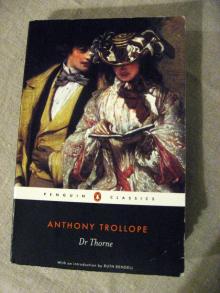 Doctor Thorne
Doctor Thorne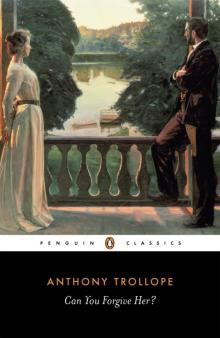 Can You Forgive Her?
Can You Forgive Her?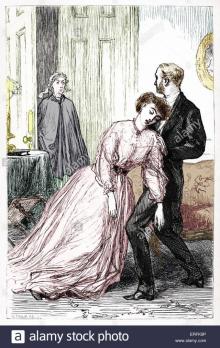 The Last Chronicle of Barset
The Last Chronicle of Barset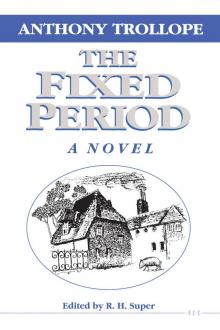 The Fixed Period
The Fixed Period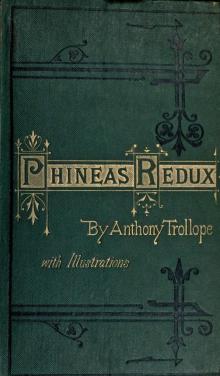 Phineas Redux
Phineas Redux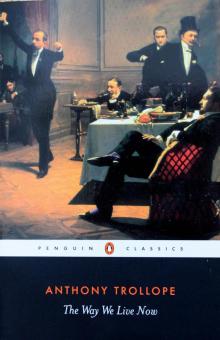 The Way We Live Now
The Way We Live Now Castle Richmond
Castle Richmond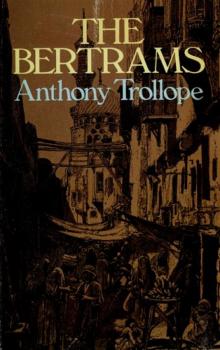 The Bertrams
The Bertrams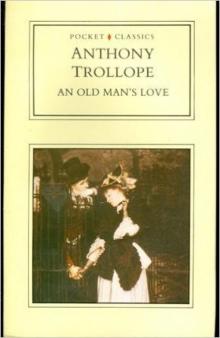 An Old Man's Love
An Old Man's Love The Belton Estate
The Belton Estate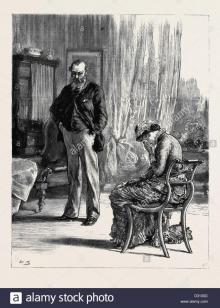 Marion Fay: A Novel
Marion Fay: A Novel The Claverings
The Claverings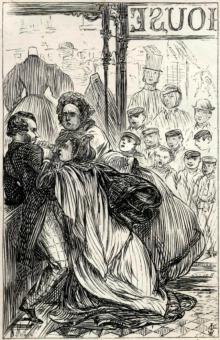 The Struggles of Brown, Jones, and Robinson
The Struggles of Brown, Jones, and Robinson Nina Balatka
Nina Balatka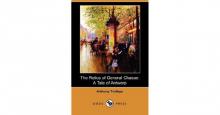 The Relics of General Chasse: A Tale of Antwerp
The Relics of General Chasse: A Tale of Antwerp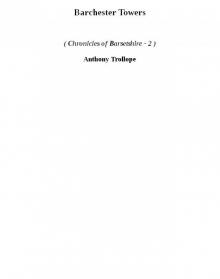 Barchester Towers cob-2
Barchester Towers cob-2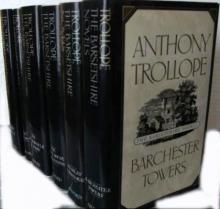 The Chronicles of Barsetshire
The Chronicles of Barsetshire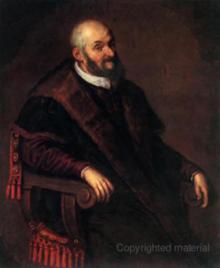 The Warden cob-1
The Warden cob-1 Framley Parsonage
Framley Parsonage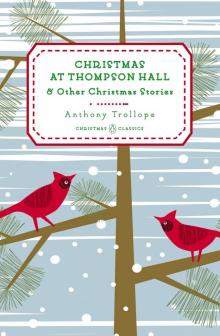 Christmas at Thompson Hall
Christmas at Thompson Hall The Warden
The Warden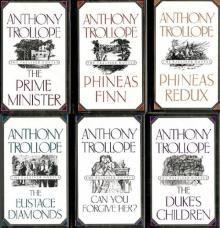 The Palliser Novels
The Palliser Novels The Small House at Allington
The Small House at Allington Barchester Towers
Barchester Towers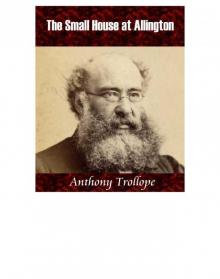 The Small House at Allington cob-5
The Small House at Allington cob-5 The Duke's Children
The Duke's Children Phineas Finn, the Irish Member
Phineas Finn, the Irish Member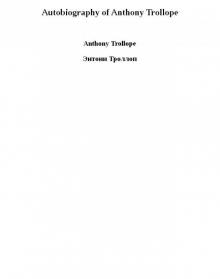 Autobiography of Anthony Trollope
Autobiography of Anthony Trollope